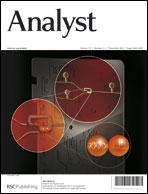Applications of reversible covalent chemistry in analytical sample preparation
Abstract
Reversible covalent chemistry (RCC) adds another dimension to commonly used sample preparation techniques like solid-phase extraction (SPE), solid-phase microextraction (SPME), molecular imprinted polymers (MIPs) or immuno-affinity cleanup (IAC): chemical selectivity. By selecting analytes according to their covalent reactivity, sample complexity can be reduced significantly, resulting in enhanced analytical performance for low-abundance target analytes. This review gives a comprehensive overview of the applications of RCC in analytical sample preparation. The major reactions covered include reversible boronic ester formation, thiol-disulfide exchange and reversible hydrazone formation, targeting analyte groups like diols (sugars, glycoproteins and glycopeptides, catechols), thiols (cysteinyl-proteins and cysteinyl-peptides) and carbonyls (carbonylated proteins, mycotoxins). Their applications range from low abundance proteomics to reversible protein/peptide labelling to antibody chromatography to quantitative and qualitative food analysis. In discussing the potential of RCC, a special focus is on the conditions and restrictions of the utilized reaction chemistry.


 Please wait while we load your content...
Please wait while we load your content...